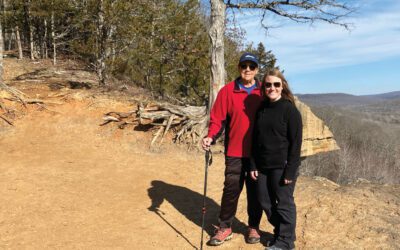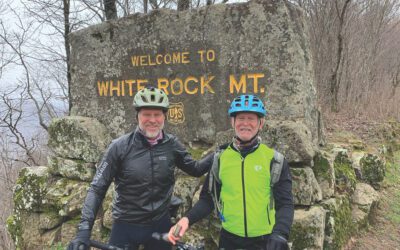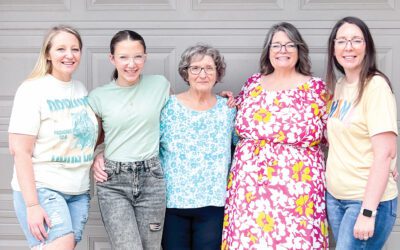[title subtitle=”WORDS and IMAGES Dwain Hebda”][/title]
Nick Watson spins the basketball lightly in his oversized hands as he sizes up his opponent. On this day, like countless other times in the gym and driveway, he’s matched against his younger brother, Christopher. Nick has some height on his sibling, but Christopher doesn’t back down, his feet a blur moving to block his older brother’s advance.
It’s an impressive athletic dance, balletic even, to watch the Watson brothers compete. Nick has spent the majority of his basketball life on the post, banging with bigger bodies, hustling for rebounds. But handling the ball, it sticks to him as if attached by magnets until he steps into a smooth, effortless jumper from the outside. The net snaps with approval.
The competitive fire is palpable. Nick, the college prospect who will play basketball for Harding University in Searcy next season, doesn’t give an inch nor any quarter to his little brother. Christopher, a rising high school star in his own right, gets the best out of his celebrated big brother. But despite the sibling rivalry, both boys grin broadly throughout the contest. As much as each wants to beat the other, they cling to the fun and freedom of just playing. In the all-eyes-on-me world many elite athletes inhabit, it’s refreshing to see such pure joy.
“That’s game,” Nick says, as the last jumper splashes through the net.
****
Only about one in thirteen high school athletes advance to the college ranks, per scholarship.com. In Nick’s case, the starting blocks on his run to the next level were dragged back several paces behind his peers. As a young child, he missed most of his developmental milestones, especially in speech, not forming complete sentences until the age of six.
At that time, the family had him tested and was told he had a range of learning disabilities, including ADHD, central auditory processing disorder and was even suspected to be autistic. The list of ramifications from this diagnosis was sobering.
“When a doctor or administrator tells you, ‘He’s not going to make it being one of thirty students. He’s going to be in a smaller classroom, have aids, therapy, he’ll never be able to comprehend math and English,’” says his mother Marian with steel in her voice. “When someone tells you that and you look at your beautiful child that God made in His image, you want to prove them wrong. Our lives have been about proving these people wrong.”
Like everything else in his path from then to now, Nick has run around, over and through his learning challenges. This spring he graduated as class valedictorian with a 4.8 GPA, the highest in the history of Arkansas High School, which he got to by stacking up enough AP classes to earn him sixty-four college credits. It’s a story that made headlines and put Nick on multiple media channels including ESPN, to say nothing of the forty-five colleges who offered more than $1.5 million in collective scholarship money to land the Texarkana phenom.
“I definitely couldn’t have done all this by myself,” Nick says. “I had a lot of extra help and support from my teachers. I couldn’t understand how to write notes and listen to the lecture at the same time. I couldn’t do it.
“My teachers let me record the lectures and take pictures of everything on the board. If there were forty slides, I would take forty pictures. I would take all that home and listen to the recordings and study the pictures. I needed to look at everything differently, because that’s just how my brain was wired.”
****
Hayden Rybiski, Nick’s soccer coach, isn’t surprised by his goalie’s success in the least.
“The first time you have a conversation with this kid, it’s clear he’s going to give you absolutely everything he has,” he says. “There’s no doubt in my mind if he had picked soccer over basketball that he would play at the next level. He’s tall, athletic, coachable; he’s a great teammate and leader. If soccer was his thing, then I have no doubt that I would’ve been on the phone with I don’t know how many college coaches.”
Basketball may have been Nick’s first love, but soccer revealed an entirely different side of the young athlete’s character. The Razorback soccer team took its lumps in Rybiski’s first year, a season that would have driven many athletes away to avoid losing, especially one with a collegiate basketball career ahead of him. Nick, however, responded to the adversity in an altogether surprising way, something Marian attributes directly to coaching.
“What this coach did was he built players up and kept them wanting to fight for another day,” she says. “We are a very young team, and in a very competitive conference. Even though they were losing, the kids were ready to go again. Nick would come home, and he was ready to go defend his school. The team, the camaraderie, the guys were so close, and they believed they could win every game and that’s a direct reflection of great coaching.”
Nick himself credited Rybiski by name in his valedictorian address, so close were the coach and star athlete. But not even the Watsons knew how symbiotic the relationship was, until the interview for this article.
“I had severe ADHD growing up,” Rybiski said to audible gasps by Nick and Marian. “I had the 504 Plan, I went the special education route, I made it out of high school with a nineteen on the ACT. I went to college and played football and now I have a very good job at a high school, something I’m extremely proud of. Nick has taken the same situation and advanced and excelled in a way that I never would have dreamed of at his age.
“Seeing his mother and him react with each other is just like me and my mother, because that’s exactly what they told her about me when I was little, I wouldn’t be able to do this and that, I wouldn’t go to college. She reacted the same way Nick’s mom has. I don’t have children, but I imagine I’d react the same way. Being around them has taught me to look past what other people tell you about certain people and find the golden nuggets inside them.”
****
As they have done ever since the boys started playing sports, Marian and Andre Watson watch their sons from the sidelines and take everything in. In both victory and defeat they have been there, with youngest son Joshua, now seven, in tow. That presence, as well as an abiding faith in God, has never escaped the boys’ view even as their accomplishments piled up.
“We’re definitely a family of faith,” Marian says. “We have this joke: my father was a pastor and my husband’s father was a pastor, so someone is bound to get into heaven on some good credit. We’re definitely covered by God’s good grace.”
The grace and support of his inner circle soaks Nick to the bone. In an era where many young athletes are too absorbed in their own headlines to pay more than lip service to family and faith, Nick’s the genuine article, well aware of how shallow accolades are, even the All-Conference and All-State designations that crowd for space on his résumé. Being the best, most celebrated player didn’t always translate into acceptance or popularity. Only the love of his Savior ran deep enough to never betray him, the family circle the only thing solid enough to withstand the storm. These alone got him here and he’s not about to forget it.
“A majority of people in high school weren’t coming up and praising how academically smart I was and how good I was at basketball,” Nick says with a shrug. “That’s why I’m so humble; no one ever said I was great other than my parents. So, I always just thought I would keep to myself, I’ll work hard and see if I can play collegiate basketball. That’s just how it happened.”
That mentality is why, when people scratch their heads over his picking Harding University over Harvard, Duke and defending NCAA basketball champion Baylor, Nick just smiles. The Bison checked all his boxes – faith-based school, good academic programs, not too far from home and a chance to play right away – in a way the name-brand institutions couldn’t match. He didn’t get this far being someone he’s not, after all, no reason to start now.
“You can’t let anyone else define who you are. Whatever you want to do, do it,” he says. “It doesn’t matter what’s going on in your life, family situations, traumatic things or mental limitations like what happened to me. They might hinder you, but don’t let that faze you. Pull through and do what you want to do so you have no regrets in life.”




